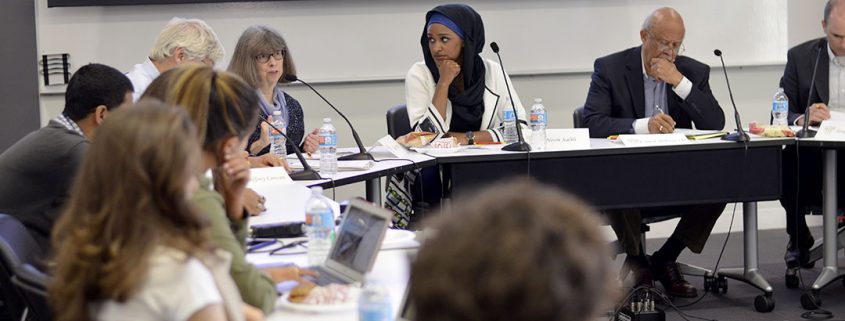Annenberg hosts forum on Trump’s executive orders
The USC Annenberg School for Communication and Journalism hosted an open forum on Thursday to deliberate the implications of President Donald Trump’s executive orders on USC, international students and Annenberg, as well as the wide-reaching repercussions affecting people across the country.
The primary topic was the temporary ban on travelers from seven Muslim-majority countries. USC is home to thousands of international students and ranks second after Texas A&M University when it comes to international students with visas from the seven countries affected by the travel ban.
Annenberg Dean Ernest J. Wilson III and Dean Emeritus Geoffrey Cowan presided over the gathering that discussed the responsibilities that USC has to uphold the rights, freedoms and safety of its students.
“The commitment of the University is to remain a great global university, and we can’t do that without great researchers and without great students,” Cowan said. “This is a huge issue for graduate students and graduate programs right now.”
Sally Pratt, vice provost for graduate programs, said she was an international student in Russia during the Cold War and understands how many students are feeling right now.
“We are lucky in the sense that our semester starts early enough that most of our people were back on campus,” Pratt said. “But there is the rest of life, there is spring break, there are people who just need to go home or visit people.”
Pratt said that the first step the University is taking is deferring the fellowships of students who may be prevented from coming to the United States in Fall 2017 because of the ban. She further talked about the personal distress and the emotional issues that are associated with these issues and invited students to seek out Student Counseling Services at the Engemann Student Health Center.
“I want you to know that we will do everything that we can to help students work through this situation,” Pratt said.
Noon Salih, an Annenberg Media Center news fellow, said that media professionals are being heavily questioned about the industry and where it is headed.
“In essence, our roles are tremendously important and the responsibility is even greater,” Salih said. “The travel ban affects everyone — those who support it, those who don’t, those who are affected by it, those who aren’t — because it changes our world internationally and domestically.”
Tony Tambascia, executive director of the Office of International Services, explained his concern that the impact of the ban has extended to faculty members from the seven countries and recent alumni who are seeking extensions to their visa status. Students and faculty who are U.S. residents may have friends in these countries and now feel separated from them.
“All Muslim students, domestic and international, are just worried about what this means,” Tambascia said. “Not just for the current restrictions but their plans for higher education.”
Cynthia Martinez, executive director of USC Annenberg Advisement and Academic Services, went on to say that USC does not admit students based on legal status, but the value that they add to the University.
“We provide our services to every student,” Martinez said. “Our office assists students with the resources that are available on the campus.”
The panel also answered questions from the students assembled at the forum and promised that there will be more gatherings in the future to establish transparency between students and the administration.
Mohammad Asghari, an officer in the Iranian Graduate Student Association who attended the event, said he wants more action on USC’s part in terms of protecting students affected by the ban.
“There have been many efforts within the school to support the students,” Asghari said. “But I can say based on my experience in the country for the past six years, unless the University makes a public statement, I don’t think there will be any change.”


The implications are you snowflakes lost, get over it.
Sadly, Trump’s contentious issue is yet one more that makes being an international student difficult, on top of our already complex culture and language. Assimilation assistance must come from numerous sources to aid these young people embarking on their life’s journey. Most struggle in their efforts and need guidance from schools’ international departments, immigration protection, host families, concerned neighbors and fellow students, and even informative books to extend a cultural helping hand so we all have a win-win situation. And yes, USC must speak out and be clear on their position.
An award-winning worldwide book/ebook that reaches out to help anyone coming to the US is “What Foreigners Need To Know About America From A To Z: How to Understand Crazy American Culture, People, Government, Business, Language and More.” It is used in foreign Fulbright student programs and endorsed worldwide by ambassadors, educators, and editors. It also identifies “foreigners” who became successful in the US and how they’ve contributed to our society, including students.
A chapter on education explains how to be accepted to an American university and cope with a confusing new culture, friendship process and daunting classroom differences. Some stay after graduation. It has chapters that explain how US businesses operate and how to get a job (which differs from most countries), a must for those who want to work with/for an American firm here or overseas.
It also has chapters that identify the most common English grammar and speech problems foreigners have and tips for easily overcoming them, the number one stumbling block they say they have to succeeding here.
Good luck to all at USC or wherever you study or wherever you come from, because that is the TRUE spirit of the American PEOPLE, not a few in government who have the loudest voice! USC must speak loudly, too.